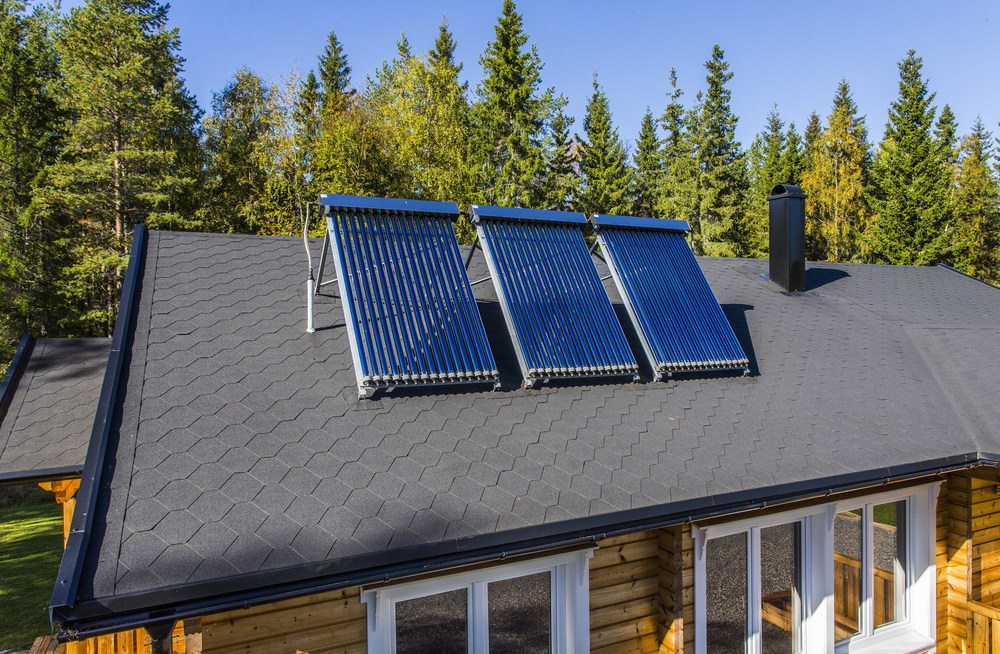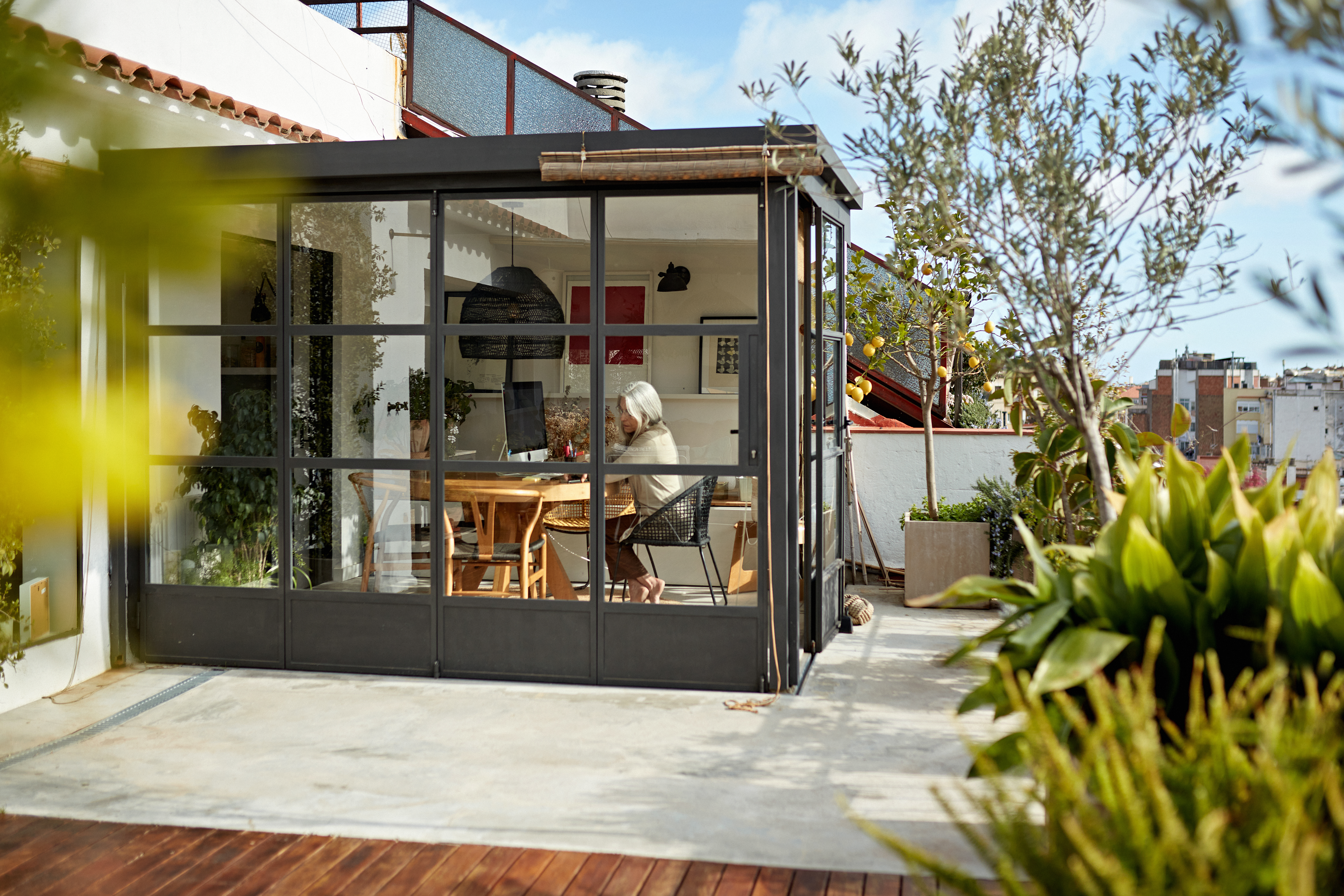What Are Solar Water Heating Systems?

If you’re like most people, you only ever think about your water heater when it’s either time to replace it, repair it, or schedule maintenance. But homeowners on a mission to reduce their carbon footprint and make their households greener, and more eco-friendly can start with their water heater.
Conventional electric water heaters and tankless water heaters are two of the most common types of water heaters found in the average American home. However, they are also the two most pollutant water heaters that release the highest rates of C02 into the environment. Solar-powered water heaters, on the contrary, produce extremely low levels of greenhouse gas emissions, reducing your carbon footprint soon after installation.
Living amidst a time where eco-consciousness drives decision-making, homeowners are refitting their homes with more modern solar water heaters. With this guide, we’ll give you the information you need on solar-powered water heaters to make the most eco-friendly decision for your home.
How do solar water heaters work?
What are the types of solar water heater collectors?
Is a solar-powered water heater right for me?
What are the pros and cons of solar water heaters?
What is a solar water heater?
Solar water heaters are heating systems that source their energy from sunlight gathered from solar panels. This energy is then converted into heat and transferred to a water tank, effectively warming your home’s water supply. Solar water heaters are the most eco-friendly and energy-efficient hot water heaters as they operate on a natural renewable energy source—no fossil fuels or coal-burning necessary.
How do solar water heaters work?
Modern solar water heaters are simple in construction but complex in functionality, incorporating a sophisticated system of pumps, storage containers, and collection devices. This intricate assembly of devices is designed to maximize the sunlight collected and converted into heat for stored water.
There are two dominant types of solar water heaters—active and passive—and each uses a different circulation system.
So, what is the difference between passive and active solar water heaters?
Active | Passive |
Active solar water heaters are more popular for domestic hot water heating. The collected solar energy is transferred through a heat exchanger to the water reservoir. Active solar water heaters use pumps to circulate solar thermal fluid through the system, employing sensors and controllers to streamline efficiency and performance as it warms your water. | Passive solar water heaters utilize solar energy without the use of internal pumps to transfer hot and cold solar fluids. Passive solar water heaters depend on the laws of physics to transfer heat from the solar collector to the water storage tank. This means heated water will naturally rise to the top of the tank. Passive solar heating systems are better suited for mild climates. |
|
|
There are three different types of solar water heaters that also employ different circulation systems. Because of this variability, solar water heaters all work a little differently.
What are the types of solar water heater collectors?
Most people don’t know that there are three different types of solar water heater collectors. While they all depend on the sun’s thermal energy to generate heat, each differs in operation or functionality.
Evacuated tube collectors
Evacuated tube collectors are typically considered the most efficient solar collectors available. Think of each evacuated tube as a kind of thermos. Each glass or metal tube containing water or heat transfer fluid is guarded by a larger glass tube. The space between them functions as a vacuum responsible for minimizing the amount of heat lost.
The most significant benefit to evacuated tube collectors is that they are able to operate well on overcast days and in cold climates. The catch is that evacuated tube collectors can run a costly bill, totaling about twice as much per square foot as flat plate collectors.
Batch collectors
Batch collector solar water heaters are also commonly referred to as Integrated Collector-Storage (ICS) systems. These systems heat the water inside dark tanks or tubes that are housed within an insulated box. The water is warmed and stored until drawn.
Batch collector systems are capable of keeping a preserve of water for long periods of time if household hot water demand is low. It is important to note that batch collectors are incompatible with closed-loop circulation systems, making them ill-fit for households in colder climates.
Flat-plate collectors
Flat-plate collectors are typically constructed using copper tubes fixed to flat absorber plates. The most common flat-plate configurations feature an assembly of parallel tubes soldered together at each end by two pipes. The goal of the architecture is to maximize the amount of solar radiation captured. The vast majority of flat plate collectors are sized to contain 40 gallons of water.
Is a solar-powered water heater right for me?
If you’re in the market for a water heater upgrade, choosing a solar-powered system is a great option worth pursuing if reducing your carbon footprint is a top priority. Do your research to find the best system that suits your expectations and demands, asking the three questions below before beginning your hunt:
Where do you live?
What is your budget?
How much hot water will you need?
Ultimately, determining if a solar water heating system is right for you will take careful consideration of the following factors:
- How much sunlight your property receives
- Your hot water demand
- Your preferred solar heating system type
- Your chosen installer’s preferred manufacturer
What are the pros and cons of solar water heaters?

Pros:
Pollution prevention: The most significant benefit to solar water heating is the simple fact that it relies on a naturally renewable resource—sunlight. As long as the sun shines, you’ll have an endless supply of heat generation energy without the environmental cost of fossil fuels or coal-burning.
According to research completed by the Environmental and Energy Study Institute, solar water heating does not generate greenhouse gases or other toxic pollutants. They also found that during a 20-year period, a single solar water heater has the potential to prevent over 50 tons of carbon dioxide emissions from entering the atmosphere.
Energy cost savings: When you swap out your traditional water heater for a solar-powered system, the savings you earn typically pays for itself within a 4 to 8-year span. Solar water heaters typically last from 15 to 40 years, which is about the same range as a conventional water heating system. Without the need for traditionally sourced and expensive electricity, your independence from the grid could earn you savings the moment you install your solar-powered system.
Low maintenance: After installation, minimal maintenance is required for a solar water heating system. Across the board, all hot water heaters and solar system storage tanks require an annual flush in order to expel all of the accumulated sediment at the bottom of the tank. Long-term corrosion is a common issue for any plumbing system, so you can still expect somewhat regular maintenance, but a well-kept solar-powered system can last 35 years or more before needing major part replacements.
Cons:
Weather dependence: One of the more significant drawbacks of solar water heating systems is how weather-dependent they are. Your particular area may not be the ideal geographic location for a solar-powered system. Homes situated in locales that experience more gray days should consider installing a backup heater for those duller days, weeks, and seasons.
Higher upfront cost: Although solar power is free, harnessing and using it in your home comes at a sizable cost. Residential solar water heating systems come at an upfront cost ranging anywhere between $1,500 and $3,500—compared to $150 to $450 for a traditional electric or natural gas water heaters, you’ll have to pay more initially to potentially save more in the long run.
Similar to solar panel financing, financing your solar water heating systems makes transitioning to green power much more feasible for eager, eco-conscious homeowners.
Summary
Making the switch to a solar-powered hot water heating system is an excellent next move for your house and for the world around you. Reaping the benefits of an improved carbon footprint, cost-effective energy generation, and more, the advantages of going solar are endless. Using this informative guide, you’ll be well on your way toward making a decision that benefits all.




